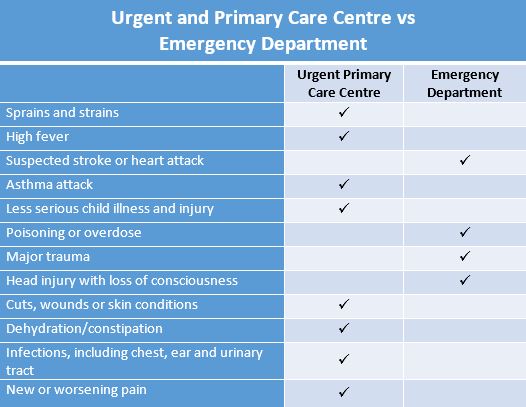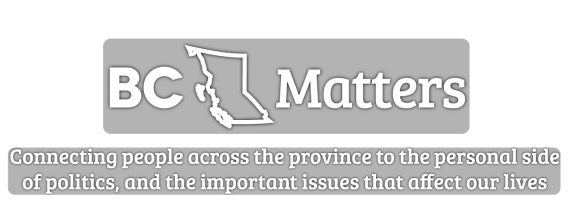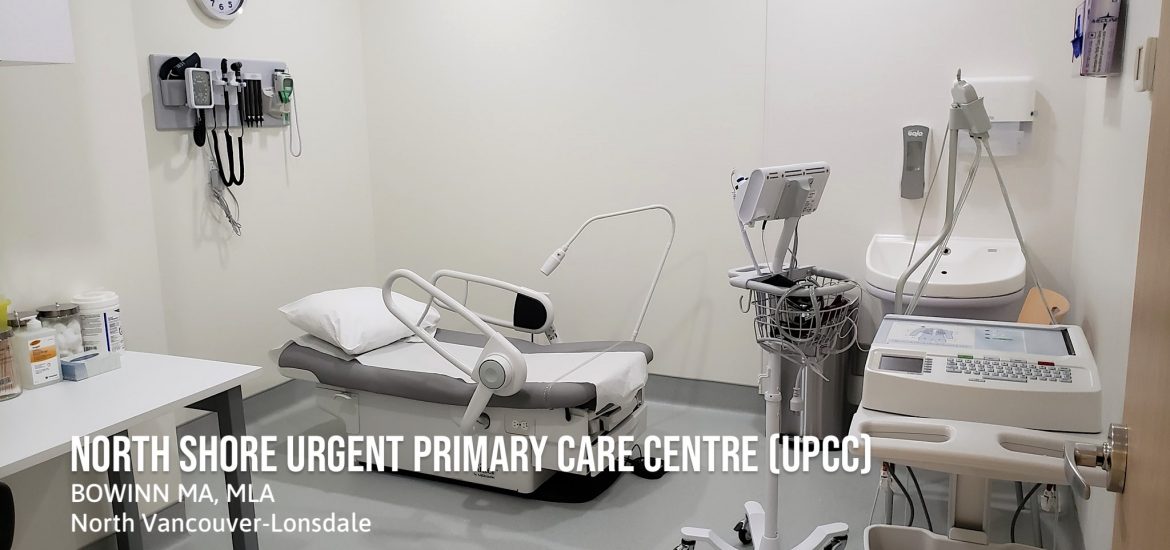
Imagine this. You’re walking to your car after getting off work one evening. It’s been a cold and wintery day and there is a thin sheet of ice beginning to cover the pavement. By this time the sun has already set and in the dark, you lose your balance and fall. You pick yourself up but notice a sharp pain in your wrist. Is it broken or sprained you wonder? Its 6 pm and you don’t want to spend all night in the emergency room but your wrist is aching and is practically immobile. It’s not that dire you tell yourself, you could go to a walk-in clinic sometime tomorrow if you really need to.
Then you remember something you heard about the new “Urgent Primary Care Centre” or “UPCC” that just opened in your neighbourhood of Lower Lonsdale. “What is a UPCC? Should I go there?” you ask yourself. Your wrist throbs. You look up directions to the UPCC and see that they are open evenings, weekends and holidays.
Once you arrive you are seen by a nurse and soon after a Nurse Practitioner. They inspect your wrist, provide an x-ray and let you know it’s a hairline fracture. Then they put your wrist in a cast to ensure you heal quickly.
After a relatively short period of time (much less than if you went to the emergency room), you are finally at home with information on how to help your wrist heal.
What is a UPCC?
We know that for many people in all corners of the province, finding same-day access to the care they need has been an issue and, as a result, they have had to resort to using the emergency department just to be seen. The previous BC Liberal government failed to address these issues effectively, leading to too many people not getting the health care they need when they need it.
Our New Democrat government is doing things differently and the changes we are making have already improved the health care system that British Columbians depend on.
As part of B.C.’s primary health-care strategy, we’ve opened 14 UPCCs throughout the province, to increase access to team-based primary care. UPCCs offer extended hours access to both primary care (day-to-day health care needs) and non-emergency urgent care (care that people need within 12 to 24 hours) while taking a team-based care approach through clinical teams comprised of general practitioners, nurse practitioners, registered nurses, social workers and other health-care professionals. This approach means patients’ care is better coordinated and more effective.
UPCCs are part of a comprehensive strategy to transform B.C.͛s health system by bringing together and coordinating with health-care providers, services, and programs to make it easier for people to access care, receive a follow-up, and connect to other services they may need.
For patients who do not have a family doctor or nurse practitioner, the UPCC will also engage in the necessary steps to best support their health-care needs and help attach patients to a local family doctor or a nurse practitioner.
This new approach will not only provide people with more options for care but will also help reduce the burden on hospital’s emergency rooms and walk-in clinics by moving non-emergency cases to the UPCC.
This is just one more way we’re working to make life better for people. While there’s still more to do and we’re not slowing down, UPCCs are a huge step forward for people all across British Columbia.
UPCCs provide:
- Extended hours of care (evenings/weekends/holidays);
- Basic in-office urgent care services (e.g., sprains and simple fractures, minor cuts requiring stitches, minor burns, rapid access to mental health and substance-use crisis intervention services);
- Assessment and treatment for non-emergency illnesses (e.g., earaches, abdominal pain, skin rashes or infections, urinary tract infections); and
- On-site or close access to diagnostic imaging and laboratory services (e.g., electrocardiograms, X-rays, blood tests).
When should you visit a UPCC?
You can contact the 24-hour HealthLinkBC help line at 8-1-1 to speak with a health professional if you are unsure about your or someone else’s symptoms and where you should go.
If you have a concern that is not an emergency, but requires care within 24 hours, you may go to an urgent care centre. Some reasons include:
- Fever or flu like symptoms
- Minor cuts or burns
- Headaches or earaches
- Nosebleeds
- Fractures or sprains
- Nausea or vomiting
- Urinary problems
You should go to the emergency department if you have a life-threatening or potentially life-threatening condition such as chest pain, stroke or trauma. Other examples of situations that you should go to the emergency department for include:
- Heart attack
- Stroke
- Major trauma
- Head injury
- Loss or severe damage to a limb in an accident
- Severe difficulty breathing
- Sexual assault
- Severe bleeding
- Loss of consciousness
- Severe abdominal pain
Finding your nearest UPCC:
As of March 2020, 14 new urgent and primary care centres across the province have been announced.
Click here to see your local UPCC’s hours of operation and address.


